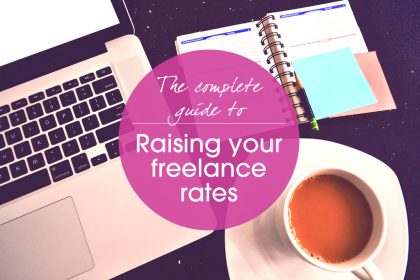Nine expensive freelance mistakes you need to avoid
Learn the nine expensive (and surprisingly common) freelance mistakes that will sabotage your freelance career, and how you can easily avoid them.
Freelancing can be a fantastic career choice, especially for mothers. It enables you to use your skills and experience to earn good money working on terms you choose. But like any career, it has it challenges. And to succeed at freelancing you need to be disciplined, good with clients, and proactive.
Over the years we’ve seen many people attempt freelancing. Some love it. They thrive on the freedom it offers and earn a living while raising their family. Others can’t find a way to make it work for them and return to the security (and restrictions) of employment.
Nine expensive freelance mistakes you need to avoid
So what separates the two groups? We’ve noticed that the people who don’t succeed as freelancers all make one or more of these nine expensive mistakes.
1) Not giving your client what they want
It’s very tempting, when a client asks you to do something you know is wrong or you really, really hate, to say no. But it’s a wise idea to fight the urge.
As much as you may disagree with their request or point of view, it’s their money and their business. Besides, they may know information or have experience that you don’t that has informed this choice.
If you really don’t want to work on their project, or worry it may damage your professional reputation, you can politely decline the project and walk away. But if you want or need the work or client, it’s much better to handle the situation professionally and give the client what they want.
Over the years, I have developed a simple four-step procedure for handling this situation:
- Clarify exactly what the client means or wants.
- Politely explain why you don’t believe this will work or is right.
- If your conversation is verbal, sum it up in an email (so you have proof later on if needed).
- If the client still insists on the work being done their way, do it (or quit the project).
By following this process I feel I have done my job (respectfully giving them the benefit of my professional experience), while keeping my client happy (ultimately doing what they ask and are paying for).
By ensuring there’s an email record of your advice, you are also protected if the project does ultimately fail. You have evidence for your client (or their boss) that you raised concerns, but these were overruled.
However, by simply refusing to work in the way the client wants, you risk being seen as a prima donna – someone who is difficult to work with, and unwilling to treat a client with respect. And risk not just losing this project, but the client and anyone they may recommend too.
(You can learn how to spot a difficult freelance client here, and get tips on how to handle them here.)
2) Not charging enough
It’s very easy to fall into the trap of cutting your prices to win work, especially if you’re new to freelancing. But this is an expensive mistake.
Often clients will value your work based on your rate. So if you cost less than other freelancers, they may assume your work is not as professional. It’s also very difficult to drastically raise your rates later on, so starting out low may condemn you to a career of poor rates.
It’s not good for your self-esteem and job satisfaction to charge too little either. If you’re constantly working for too little, it’s easy to become resentful and hate the work you’re doing. You may rush your work to try to make projects more cost-effective for you, or take on too many projects to ensure you earn enough.
Much better to establish a fair rate and confidently quote this rate to clients. If they value quality work then they will pay. If they just want a cheap job, then maybe they aren’t the type of clients you want to attract anyway.
(You can read advice on how to charge what you’re worth here, and get tips on how to raise your freelance rates here.)
3) Not managing your time properly
As a freelancer you don’t have a manager watching over your shoulder, setting you deadlines and standards to meet. Instead you need to be your own timekeeper and quality controller. And this isn’t always an easy step to make.
It’s tempting to make excuses not to knuckle down to work as a freelancer, especially if a friend invites you for coffee or it’s a lovely sunny day. “It’s okay,” you may tell yourself, “I can work on this later.” But this is an expensive mistake.
‘Later’ may not leave you enough time to complete your work properly, especially if it’s trickier than you first thought. I remember on one occasion I told a client that I had already started a project, even though I was actually out with a friend. When I finally got round to starting it at 7pm (for a morning deadline) I realised that the brief was incomplete and I couldn’t work properly on it. But having told the client I HAD begun it that morning, I would just have to muddle through.
So make sure you set enough time to work on your project, and get it done properly. I now schedule my work in, and make sure I complete it before enjoying free time. I’ve also identified and eliminated my favourite procrastination habits (such as Facebook) and learned to sit down at my desk at 8:45am and treat my work day as that – a work day.
I may not have a boss watching over me now, but I act as if I do. That means I get my work completed in working hours, and can enjoy my time off. And if I do want to meet up with a friend or spend time with my children, I book it into my day around my work commitments – and enjoy my free time with a clear conscience.
(You can read 10 quick time management tips for working mums here, and learn how to make time to work from home here.)
4) Not having the right tools for the job
Before you launch a career as a freelancer, you need to invest in the right tools for your job. At its most basic, this will probably include a laptop and phone.
And don’t simply assume that your old home laptop will do. A crashed programme in the middle of a work project can be an expensive accident. And a slow or virus-infected laptop can cost you precious work time – especially if it decides to play up on a deadline.
So before you embark on any freelance projects, make sure you have all the equipment you need, and that it’s in good working order. Perhaps you can get your laptop serviced, or sell it to a cash for laptop business, add the proceeds of the sale to your budget, and purchase a new one. You can also have your printer checked and install the necessary tools and software you might need for the job.
You may also want to investigate other apps and software that will help you to work smarter and juggle your responsibilities better – automating processes, setting up alerts for important emails, and enabling you to work on the move if you need to.
(You can get tips on clever apps to help you juggle work and family here, and find out how to stay human when you’re a freelance mum here.)
5) Not marketing yourself properly
As a freelancer you can never afford to stop marketing. Just because you’re busy now doesn’t mean it’s always going to be that way. At any given point your most profitable client can disappear – and leave you financially out on a limb.
Maybe they’ve gone out of business, your contact has left, their need has changed, they’ve employed someone full time to do your work, or they simply found a better freelancer… there are dozens of reasons why clients stop using their freelancers, so you can never afford to rest on your laurels.
For this reason you should have systems in place to market your services to new clients. And these systems should be running all the time, including when you are overwhelmed with work (you can always tell a client you’re too busy to take on new work if they enquire – it doesn’t hurt to show people you’re popular).
So how do you market yourself? There are lots of ways you can help spread the word about your services, both free and paid. Here are a few:
- Listing on an online freelance directory.
- Freelance job sites.
- Social media profiles and activity.
- Paid social media ads and updates.
- Networking – both online and face-to-face.
- Write a blog.
- Your website.
- Google Adsense ads.
- Establishing a reputation as an expert in your field.
It may take some experimenting before you find the perfect mix of marketing. For me, I rely on just two things: a listing on a freelance directory and my website. The directory has great SEO so if someone searches for a copywriter in my area my profile comes up, and potential clients can visit my website to find out more. Aside from word of mouth recommendations this is how I find all my work, and the listing costs just £6 a month.
So if you’re not doing so already, start thinking of creative ways you can market your services to your ideal clients – even if you have plenty of work right now.
(You can read the pros and cons of freelance job sites here, and 10 quick marketing tips that work for freelancers here.)
6) Not taking breaks
It’s very difficult to plan holidays or days off when you’re a freelancer – and for good reason. You never know when an exciting new project may come in, or a client will need you.
In fact, if you want to guarantee that a new project will come in, or a client will want to see you NOW, book a holiday! It’s the surest way to encourage new work.
Three years ago, I flew to Florida to visit my sister. After I landed I checked my emails, and sure enough a large project for an important client – one that they’d been talking about for six months – had come in and they wanted the work urgently. I couldn’t afford to lose this client, so I got up early every day (the one occasion jet lag worked in my favour!) and worked before sightseeing with my family.
It’s for reasons like this that, for the years that my partner and I were both freelance, you could count the number of holidays we took as a family on one finger!
But this isn’t healthy. You can’t keep going indefinitely without some form of break. It’s not good for your health, your relationship or your work. You need time away from your freelance work, however much you may enjoy it, to recharge your batteries and get some perspective – especially if you’re a mum juggling the commitments and responsibilities of your home and family too.
And in fact, taking time away from work, even if it’s just a few hours, makes good business sense. You’ll have much more to give your work (and clients) when you’re relaxed and happy – and not resentful and tired. Freelance can be a wonderful, flexible career that enables you to work around your children and schedule your workload according to your lifestyle needs. But only if you design it that way.
So even if it’s just booking a day or few hours out with friends, or on your own, make a point of scheduling regular time for yourself – and stick to it. It’s something I have learned to do, and my career has benefitted hugely from it.
If a client does get in touch, unless it’s your dream job or client and they NEED it then, ask them if the project can wait and let them know when you can work on it. Sometimes you’ll find that the cast-iron deadline they attempt to pin on you has more flexibility than it appears. And if a client doesn’t respect your need for breaks (would they give up their own holiday?) then is it really a client you want to work for?
(You can read tips on how to survive the school holidays when you work for yourself here and how to make ‘me time’ for yourself here.)
7) Getting distracted
When you’re working on your freelance projects you need to make sure you’re really working. It’s very tempting, especially with no manager looking over your shoulder to ‘just’ check Twitter or the news, and suddenly realise an hour has been swallowed up in aimless web surfing.
Another big distraction when you work from home is all the household jobs that still need to be done. When faced with throwing yourself into a tricky new freelance project, it’s amazing how attractive a pile of ironing or the washing up suddenly becomes!
To maximise your chances of being properly productive when working from home you need to tune out distractions. Ideally, you’ll find somewhere quiet to work, preferably a place you can switch off from your home while you work, and shut away at the end of your work day, creating a clear divide between home and business.
If you can’t steal a spare room or corner of a room in your home, you may want to look into coworking spaces. Not only will it give you a professional workspace away from household distractions, but it can eliminate the loneliness of homeworking and introduce you to potentially useful contacts. (Read five signs you may be ready for coworking.)
And while you’re working, ban yourself from any other tempting distractions. If you can, turn off your phone and make a pact with yourself not to check Twitter or Facebook until you’ve completed your work. Perhaps reward yourself with a (strict!) ten minute break once you’ve done 90 minutes of hard labour.
At first it may feel hard to break old habits, but you’ll soon find it easier to naturally slip into work mode and tune out the outside world. Not only will your productivity levels rise when you do, but you can enjoy your well-earned breaks, smug in the knowledge that you’ve already achieved a lot.
(You can learn how to cope with distractions when you work from home here, and read how to work productively in targeted 90-minute focus blocks here.)
8) Biting off more than you can chew
While it’s tempting to say ‘yes’ to every potential freelance project that comes your way, it can be a VERY expensive mistake. Take on too much work and you’ll struggle to complete it in time to the standard your client may have come to expect.
When you’re working long hours or rushing to get things done, it’s easy to make small, silly mistakes. You’re also more likely to cut corners to try and make a job easier – none of which will enamour you to your client.
If that client is new, they’re likely to form their impression of you as a freelancer based on that one project. And if it’s obviously rushed or riddled with mistakes they’re unlikely to come back for more or recommend you to other people.
If they’re a regular client they may assume that either your standards or slipping or they’re no longer important to you, and may consider giving another, apparently keener, freelancer a shot at their next project.
And it’s not just taking on too much work that can get you into hot water. Occasionally a client may ask if you can do something slightly outside your skill set – and if work is slow at that time it’s easy to find yourself again saying ‘yes’.
But if you’re not honest (and realistic) about the extent of your abilities and experience, it could go horribly wrong. For example, if you tell a client you can write SEO copy but in reality you have no idea, they could easy find out. And once they realise they’ve been duped, they’re unlikely to use you again.
So always bear in mind the freelance saying, “You’re only as good as your last piece of work,” and ensure that you only take on work you are confident you have the time and ability to do well. It’s the only way to keep your clients happy, and coming back to you for more!
(You can learn how to manage your working time better here, and six ways to be more organised and work smarter here.)
9) Not managing your finances properly
As much as you may hate administration and finances, it’s an inevitable part of being a freelancer. Unless you earn enough to outsource it, you don’t have the luxury of a secretary and accounts department to deal with your admin – and you overlook it at your peril.
At the most basic level, failing to inform HMRC that you’re self-employed, or setting up a Ltd company if you’re in the UK, could get you in trouble down the line (and land you a hefty fine). Beyond that, you need to ensure that your paperwork is in order, and filed on time every year.
It’s also important to keep on top of your freelance invoices and ensure you establish a robust credit control system. There are rules and systems in place to help you collect money from your clients, but if you don’t know what they are you risk making life a LOT harder and more expensive for you.
For example, did you realise you could legally apply a late payment charge to unpaid invoices? Or that in order to enforce payment terms you have to provide them to your client before you start a job?
You’re working as a freelancer to earn money, and as unpleasant as finance and admin may be, they’re essential to ensuring that you are paid properly and on time for your work – and don’t risk losing any of your hard earned cash in fines! So make sure you’re aware of the rules and run your freelance work like the successful business it should be.
(You can read 10 business cash flow mistakes you need to avoid here, and find out if you’re working illegally and when to inform HMRC here.)










